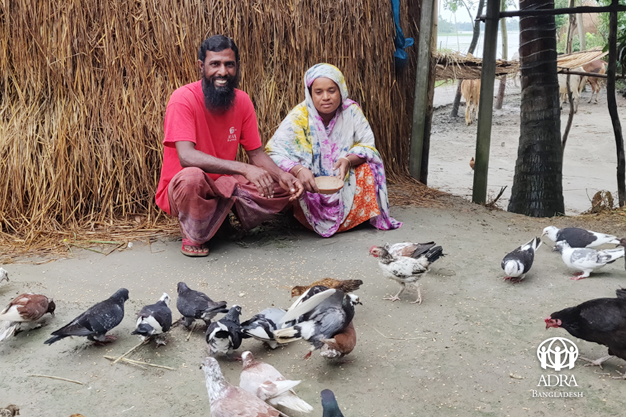A Life Changing Story of Toffazzal
ADRA Bangladesh is operating a project titled “Empowering Flood Prone Poor Community Project (EFPPCP)” in Manikganj district of Bangladesh. This project is working to improve the livelihoods situation of the community through facilitating sustainable agriculture to achieve food resilience.
Md. Toffazzal Hossain is a 40 years old poor farmer who was bornin Bondholat village, Manikganj district. He studiedup to grade nine and discontinued his education due to financialstruggles. Toffazzal got married when he was 28. His wife Mst. Razada Khatun, 35 years old. was born in Lawtara village (an adjacent village from where Toffazzal lived), Manikganj district. They have been married for nearly 12 years with no children.
Toffazzal have been struggling with living in a flood prone area. Due to flood, he has lost his properties in the past. “There is a lack of adequate dam in his area which makes our lives miserable.,” said Toffazzal. “Road problems are further hampering the development of our living standards,” he added.
Last month, strong winds brought by storm resulted to damages to his house and food crops. Toffazzal had to spend a lot of money to fix his house and cultivate his land. The threats of extreme weathers to his livelihoods are putting him and his family at risk.
Both Toffazzal and his wife heard about the work of ADRA Bangladesh in 1997 and 2007 when ADRA Bangladesh was operating emergency relief programs in Manikganj.
In 2014, Toffazzal was able to benefit from one of ADRA Bangladesh’s programs.
Toffazal took part in a training program conducted as part of the EFPPCP implemented by ADRA Bangladesh. Through this training, he was able to learn innovative agrarian technologies useful to increase his agriculture production. Among other approaches, the System of Rice Intensification (SRI) allows farmers to produce crops almost more than double from using the same size of land. Toffazal was also able to learn the appropriate techniques in rearing poultry, cows, pigeons, as well as how to produce Vermicompost. Vermicompost isproduced using various species of worms, usually red wigglers and other earthworms, to create a mixture of decomposing vegetable or food waste, bedding materials, and vermicast, helping to make soil more fertile.
Toffazal has received several training sessions mostly on income generating activities and agriculture to increase his household agriculture production. Toffazal has also received training on seed selections and preservation. Nowadays, he no longer need to buy the seeds from the local market as he has the ability to preserve his own seeds and he knows how to produce Vermicompost, helping him to increase production.
Toffazal has also received several types of fruits and teak-wook tree saplings from ADRA Bangladesh. Now, he is sharing about his experience and skills to his neighbours so that they can also benefit from the innovative techniques as well.
The main source of income for Toffazal’s household comes from small scale agriculture activities. He cultivates rice, mustard, maize, and different types of vegetables in his own land. After receiving the training from ADRA Bangladesh on rearing pigeons, cows, poultry, goats and how to produce Vermicompost, Toffazal has started rearing cattle and poultry. Now, he has 13 pairs of pigeons, three goats, 26 chickens and three cows. Meanwhile, his wife is helping him to cultivate vegetables in the yard.
ADRA Bangladesh has also helped to raise their cluster with mud plinths, helping to minimize the impact from flood risk.






























